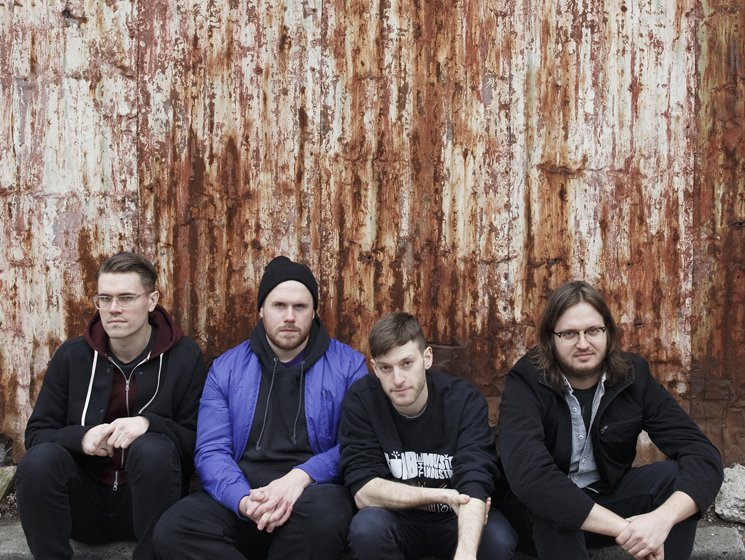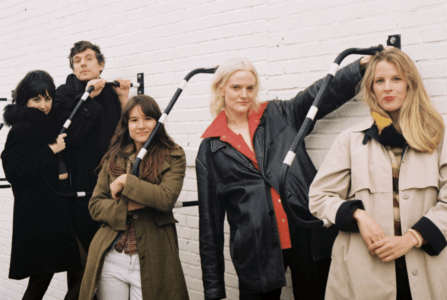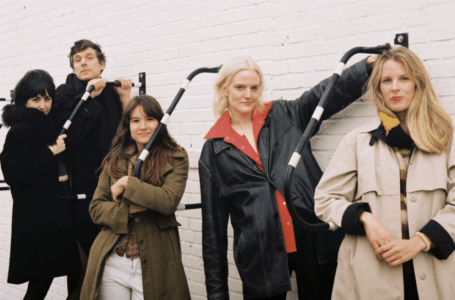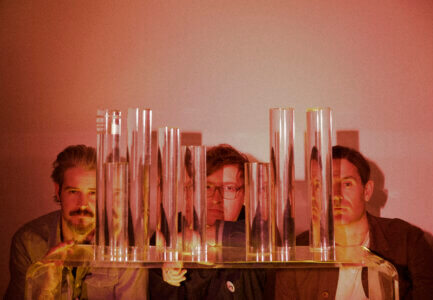Interview with Steve Sladkowski of PUP

While PUP may stand for “pathetic use of potential”, the Toronto punk band are the complete opposite. After touring relentlessly for two years in support of their self-titled debut album, the boys had established an international name for themselves. With their sophomore release looming on the horizon and a North American tour alongside close friends Modern Baseball underway, lead singer Stefan Babcock received the news that “the dream is over” after doctors found a hemorrhaging cyst on his vocal cords. Instead of accepting defeat, PUP valiantly carried on and Babcock treated himself with the proper care needed to ensure that this ride wouldn’t be stopping anytime soon. PUP’s sophomore record The Dream Is Over, taken directly from that doctor’s fateful sentencing, was released to critical acclaim on May 27. Lead guitarist Steve Sladkowski was kind enough to lend some of his free time while waiting in a Texan airport to discuss touring, the importance of ensuring that shows are safe spaces and how his passion for sports intertwines perfectly with his craft.
Northern Transmissions: We all know how The Dream Is Over came to be for Stefan and his situations with his vocal cords, but what’s the story behind the album for you? Where were you at, mentally and physically, during the making of this record?
Steve Sladkowski: I remember on the last kind of tour before we went in to record and kind of finish writing the record, just being very tired. Still really stoked on everything, but it was starting to become more gruelling and more exhausting. At the same time, it was really, really nice to have that change of pace in terms of getting to focus in more on new songs and go home and deconstruct and do the exact opposite of being on the road. That was kind of nice. We were all really, really excited to record, even though we were kind of tired and just burnt out almost.
NT: Inevitably, you guys played over 200 shows alone in 2014 so you’re at well over 600 by now.
SS: It was the kind of thing where it was cool opportunities. We just kept saying yes because things sounded cool and we didn’t want to not do cool things. Then it just slowly, sort of added up and we kind of, maybe, bit off a little more than we can chew in hindsight but at the time, why not keep going and keep doing shows in cool places?
NT: I think that’s something that a lot of young and up-and-coming bands need to follow. Don’t say no to opportunities, take as many shows as possible because you never know what it could bring.
SS: Yeah and I mean, it is one of the most important ways that a band can kind of make this whole thing sustainable, just by playing a lot and really trying to get better at touring and build up fan bases in places. We started really small, just like any other band, like on the weekends going to Ottawa or London or Montreal. From there, it just started slowly working and expanding a little bit, we’d drive down to New York and play in Buffalo on the way to New York. Just really, really trying to build, to grow, and to not be afraid to play to no one and eat shit in a city that you’ve never been to before.
NT: What was the situation like for you guys? Were you working as well as managing touring? When did it become your fulltime job?
SS: When we were making the first record, we decided to go all in. To tour properly, it’s hard to maintain a job and the kind of touring schedule that we had. We knew then that we were going to be struggling and poor and all of that. We’re still struggling and still poor, but it becomes a little bit easier every time we go on tour which is nice. That’s because we’ve been lucky in that people have responded to our records and our live show. It’s also just something, like anything, if you practice and you work at it, you get a little bit better at touring. We’re touring with a trailer now which means we have more room in the van, which means everyone’s more comfortable, which means everyone’s better rested, which means everyone’s healthier – it’s all just little stuff like that.
NT: It’s a lot of work but it’s definitely worth it. You guys are the prime example of that. In just over two years’ time, you played Sneaky Dee’s for your self-titled album release show and just last month, you sold out the Phoenix. Was that pretty surreal?
SS: Yeah, that still doesn’t feel real. I just saw a video clip from that show and it was wild. We’ve been really vocal about what the city (Toronto) means to us and what the scene means to us. Without fans in Toronto rallying around what we’re doing, we wouldn’t have been able to take it elsewhere. It always feels good to play a show at home and the fact that it was sold out and at the Phoenix and all of that was – that’s something you dream about.
NT: Absolutely. What are your earliest memories of going to shows in Toronto?
SS: Definitely the Reverb and the Kathedral and the Big Bop. Do you know what that is?
NT: I feel like it might be a bit ahead of my time.
SS: You know at Queen and Bathurst there’s a Crate and Barrel around the corner? That used to be an all ages venue with three different rooms and that was where all of our horrible ska bands in high school would play. It’s where we first saw bands like The Planet Smashers and early punk shows, Rancid had played there way back. That was a really, really big spot for everyone to go see shows. That was probably the most influential and important place. Not only could you see bands that you really like, but if you were in a band, that would often be the place. You would play the Sunday afternoon matinee show. It was a really great place.
NT: The album release show was all ages. Do you guys try to do as many all ages shows as possible? Do you feel like that’s important?
SS: Yeah, I do think it’s important. In some places, especially in the US, it varies state to state. Sometimes it’s a lot easier to do an all ages show that just feels like a normal show and there’s not as much separation between where they put the kids and where they put the drinkers. Wherever we can, we try to do all ages shows because we are aware of how important that is to a local community. That was how we all got our start. Whenever we can, it’s one of the most important things to do.
NT: You guys are very big on promoting safe spaces at your shows. You’re known to make sure that people in the crowd are okay, give out water – you encourage everyone to be kind to one another. That totally rings true. Everyone seemed to coincide really well at the album release show, which was great to see. What does it mean to you to ensure that your shows are safe spaces for everyone?
SS: To me, it just feels like – and I’m not saying negative things haven’t happened, but when people go to punk shows, those are the kinds of spaces that are almost expected. We’re not going to say “Don’t have a mosh pit” or “Don’t crowd surf” but just be respectful and aware of space and ensuring that everyone can have a good time on their own terms without infringing on anyone else’s. It’s unfortunate that it needs to be stated explicitly but it’s very easy to do that in a way that everyone can understand and allows for everyone to have a good time, regardless of whatever walk of life they come from.
NT: You guys are friends with some good people on the road who promote that as well. The initiative that Modern Baseball set up with the phone line makes it clear that everyone is aware and trying to make a difference.
SS: Yeah, and that’s as much about knowing what works for what band. We actually talked to Modern Baseball about that phone line thing a couple of weeks ago because we’ve been kind of crossing each other on tour. They’ve said it’s been working well for them too, so it’s great that bands are responding but also that the community around the bands is responding. It feels a lot easier for the people who maybe have tickets to go see us, and then Modern Baseball, to know that there are things that can be done on either side. Whether it’s something as hands on as the Modern Baseball thing, or something with us where it’s been stated but doesn’t have to be repeated as often. It’s different styles for different bands and different crowds demand different styles. I think it’s just great that the issue is being attacked on all sides because that’s really how you stimulate awareness, and this show culture just becomes a more positive and better space because of it.
NT: Absolutely. What would you say your favourite memory of tour so far in 2016 is?
SS: Oh wow. There have been some pretty good ones.
NT: I like the one that I read about you eating a hash brownie on your birthday.
SS: Oh yeah, in Berlin. That was really awesome. That was my first tour birthday actually. I’d never had a birthday on tour, so that was pretty fun. It was nice, and then Europe too and everything. This tour has been really, really great. We’ve sold out all but two shows and that’s really amazing to see how it’s grown and see people’s responses. I think to me it’s still wild, getting back to the European thing, to get on an airplane with a guitar and go and play shows. I don’t know, it’s all just been kind of a whirlwind this year. I’m just excited to be back out on the road and playing shows. It’s been nice. Everyone feels good, everyone is healthy and really excited about what’s going on.
NT: Speaking of guitars, you were recently given a free American Elite Telecaster Thinline from Fender, fulfilling a teenage dream of yours. Is it personally made for you?
SS: No, it’s a stock model from their Fender shop.
NT: That’s still pretty fucking cool though.
SS: Yeah, that was one of the coolest things that has ever happened. It’s never something that you can predict. I was actually just looking for a price break when I first reached out to Fender, because I didn’t think that any of them knew who we are. I’m not Eric Clapton or some shit. I just thought it would be kind of cool to see if I could get some artist pricing but they were really, really generous and really great. Fender have been my favourite guitars since I started playing guitar, so the fact that I can now actually work and build a relationship and promote instruments that I believe in – it’s really cool.
NT: I like what you said about how being given this has inspired you to keep practicing and bettering yourself.
SS: Yeah, I think that should be what – you know, I’m 28 and I’ve always wanted to be a professional musician. Now that I actually kind of am one, you have to put in as much, if not more, work once you’re here than all the work you put in when you got here. I still go to music stores – we were just in Nashville a couple of days ago, and I went to a music store and bought a method book about bluegrass and country music guitar to just learn and see what that’s all about. Always be exploring and trying to learn and figure out new stuff. Work, work, work, work.
NT: I think that’s what makes you and the rest of the guys just one of the most genuine bands that we have right now. You’re so true to your craft and so appreciative of everything that you have. It doesn’t go unnoticed.
SS: I appreciate that, thank you.
NT: How do you think your passion for both basketball and baseball play a role in your music?
SS: I think, in a way, you’ve kind of answered the question. One of the things about professional athletes is that they also are dedicated to craft. That’s not to say that professional sports doesn’t have its issues and music has issues too. It is as much like a mirror of society as it is something inside of it. What I appreciate is that as much as you feel like you can predict how a show’s going to go or how a baseball game is going to end, there’s always some element of unpredictability to it. One of the most exciting things is watching people who are dedicated to their craft have to improvise and totally throw out all of their training and just kind of respond in the moment. I think in the best sports situations and in the best kind of music situations, you often will get those sorts of situations and that’s where the most excitement and beauty is found.
NT: One last thing – what is the latest on Stefan’s vocal cords? You said everyone has been healthy so I’m taking that as a good thing.
SS: Yeah, we just took it a bit easier on this tour and didn’t play as many shows in a row. We’re eating better and sleeping more and just trying to stay healthy. As much as possible, we’re trying to not have as huge of a difference between the road and home. Just taking care of ourselves and there are little lifestyle changes that he’s made. He can’t drink as much and we can’t yell at each other in a loud bar or club. But it’s all stuff that – again, it’s dedication and wanting to continue to work and put the time in and really do this. We’re willing to do whatever we need to do to make it work and that’s what we’re doing.
Interview by Ava Muir
Latest Reviews
Tracks
Advertisement
Looking for something new to listen to?
Sign up to our all-new newsletter for top-notch reviews, news, videos and playlists.









